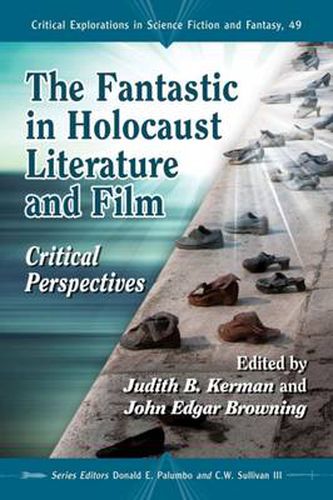Readings Newsletter
Become a Readings Member to make your shopping experience even easier.
Sign in or sign up for free!
You’re not far away from qualifying for FREE standard shipping within Australia
You’ve qualified for FREE standard shipping within Australia
The cart is loading…






This title is printed to order. This book may have been self-published. If so, we cannot guarantee the quality of the content. In the main most books will have gone through the editing process however some may not. We therefore suggest that you be aware of this before ordering this book. If in doubt check either the author or publisher’s details as we are unable to accept any returns unless they are faulty. Please contact us if you have any questions.
When the real is so fantastic, what literary effects will succeed in making it credible and help readers to comprehend its human meaning? As recent world developments fully show us, several lessons of the Nazi Holocaust still remain to be learned. To respond meaningfully and ethically to the Holocaust, writers need to incorporate moral and emotional complexity, and one way they have done this is through using the techniques of the fantastic. The authors in this anthology of essays examine the usefulness of fantastic story-telling for exploring relevant philosophical and moral issues about the Holocaust.
The present volume is interdisciplinary in scope, including print literature and film, animation, graphic novels, and various other media. The editors have sought essays that, while ranging in theoretical perspectives, engage in dialogue with one another, together producing a comprehensive whole. Examined are writers like JaneYolen and Art Spiegelman and such works as the sci-fi television series V (1983), Stephen King’s novella Apt Pupil (1982), Guillermo del Toro’s imaginative Pan’s Labyrinth (2006), and Martin Scorsese’s dark thriller Shutter Island (2010).
$9.00 standard shipping within Australia
FREE standard shipping within Australia for orders over $100.00
Express & International shipping calculated at checkout
This title is printed to order. This book may have been self-published. If so, we cannot guarantee the quality of the content. In the main most books will have gone through the editing process however some may not. We therefore suggest that you be aware of this before ordering this book. If in doubt check either the author or publisher’s details as we are unable to accept any returns unless they are faulty. Please contact us if you have any questions.
When the real is so fantastic, what literary effects will succeed in making it credible and help readers to comprehend its human meaning? As recent world developments fully show us, several lessons of the Nazi Holocaust still remain to be learned. To respond meaningfully and ethically to the Holocaust, writers need to incorporate moral and emotional complexity, and one way they have done this is through using the techniques of the fantastic. The authors in this anthology of essays examine the usefulness of fantastic story-telling for exploring relevant philosophical and moral issues about the Holocaust.
The present volume is interdisciplinary in scope, including print literature and film, animation, graphic novels, and various other media. The editors have sought essays that, while ranging in theoretical perspectives, engage in dialogue with one another, together producing a comprehensive whole. Examined are writers like JaneYolen and Art Spiegelman and such works as the sci-fi television series V (1983), Stephen King’s novella Apt Pupil (1982), Guillermo del Toro’s imaginative Pan’s Labyrinth (2006), and Martin Scorsese’s dark thriller Shutter Island (2010).